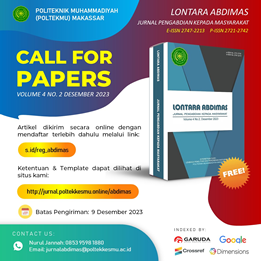Pendidikan Kontrasepsi Pada Wanita Pasangan Usia Subur Sebagai Upaya Antisipasi Baby Bomming Di Masa Adaptasi Kebiasaan Baru Pasca Pandemi Covid-19 Di Wilayah Kecamatan Kuta Utara
Abstract
The results of family planning services during the COVID-19 pandemic in national scale has decreased
in the number of contraceptive uses reaching 40% in almost all regions in Indonesia (BKKBN, 2020). This could
be caused by various problems, including an increase in the number of unwanted pregnancies and baby booms or
increase of birth rate. This is due to the obstruction of access to services, delaying access to health facilities due
to fears of contracting COVID-19 and increasing of husband and wife sexual intercourse without using
contraceptives that inducing pregnancy. Based on the results of Widiastuti's research in 2020, where a survey was
conducted to find out the description of family planning use during the pandemic in the North Kuta District, it was
found that half of them (53.2%) of respondents were using contraceptives and almost half of them (46.8%) of
respondents did not use contraception. One of the efforts to suppress the surge in baby births is through the Family
Planning program for couples of childbearing age. The aim of this community service is to provide knowledge
about contraceptive tools and methods in suppressing the surge in baby births. The targets are women of
childbearing age aged 15-45 years who have not used contraception or who use and do not make repeat visits as
many as 30 people. The implementation of the activity was carried out by assessing the level of understanding of
the respondents by pre-testing through google forms, implementing counseling, family planning counseling and
introduction of contraceptives and evaluating the material by post-testing via google forms. The results of the
activity show that there is an increase in mother's knowledge about family planning tools and methods, which is
expected to influence the behavior of woman in using contraceptives so that they are expected to anticipate the
occurrence of baby boom.
References
Aprillia, Yuna Trisuci, et al. “Analisis Penggunaan Alat Kontrasepsi Sebelum Dan Saat Pandemi Covid-19.” Jurnal Untuk Masyarakat Sehat (JUKMAS), vol. 4, no. 2, 2020, pp. 190–200.
Aslam, F. (2020). COVID-19 and Importance of Social Distancing. Preprints, 30(1), 1–6. https://doi.org/10.20944/preprints202004.0078.v1
Dina Fitriana Rosyada, Rita Dian Pratiwi, E. N. W. (2020). Family Planning Services by Midwifery of Private Midwifery Practice in Yogyakarta During the Pandemic Period of Covid-19. Jurnal Ilmu Kesehatan Masyarakat, 11(July), 123–135
Lora Ekana Nainggolan., et al. (2020). Belajar dari Covid-19: Perspektif Ekonomi & Kesehatan (1st ed.). Yayasan Kita Menulis. Megaria Purba, Endang Budiati, A. D. (2020). Determinan Perilaku yang Berhubungan dengan Terjadinya Unmet Need KB pada Pasangan Usia Subur (PUS) di Kota Bandar Lampung. Malahayati Nursing Journal, 2, 491–504.
Nurjasmi, E. (2020). Situasi Pelayanan Kebidanan pada Masa Pandemi COVID-19 dan Memasuki Era New-Normal. https://www.ibi.or.id/media/Materi Webinar IBI - USAID Jalin Covid19/Seri 5 - 10 Juni 2020/PDF 1 Emi 10 Juni USAID Jalin SITUASI PELAYANAN KB PADA MASA PANDEMI COVID-19 %26 ERA NEW NORMAL -compressed.pdf
Purwanti, S. (2021). Dampak Penurunan Jumlah Kunjungan KB terhadap Ancaman Baby Boom di Era Covid-19. Jurnal Bina Cipta Husada, XVI(2). Sumarroh, Z. (2015). Hubungan Tingkat Pengetahuan, Sikap dengan Pelaksanaan Konseling Awal Kontrasepsi oleh Bidan pada Pasangan Usia Subur (PUS) di Puskesmas Kota Yogyakarta. In Biomass Chem Eng (Vol. 49, Issues 23–6).
Kemenkes RI, BKKBN. “Panduan Pelayanan Keluarga Berencana Dan Kesehatan Reproduksi Dalam Situasi Pandemi COVID-19.” Kemenkes RI, 2020, p. 5.
Widayati, D. (2020). Fenomena Baby Boom dan Pengangguran di Masa Pandemi Covid- 19. Https://Www.Kompasiana.Com/Diana24933/5f95904bd541df7e241013c2/Fenomena -Baby-Boom-Dan-Pengangguran-Di-Masa-Pandemi-Covid-19.
Witono, S. P. (2020). Kepesertaan Keluarga Berencana Pada Masa Awal Pandemi Covid- 19 di Daerah Istimewa Yogyakarta. Jurnal Kependudukan Dan Keluarga Berencana.











